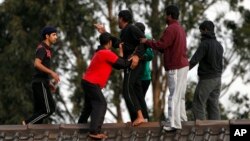A psychiatrist has told a Human Rights Commission inquiry that Australian immigration officials asked him to bury damning statistics about the deteriorating mental health of children in detention. Peter Young was a medical director for the immigration department for three years until he quit recently. He is the most senior figure to condemn Australia’s detention system, for would be immigrants, from within.
Mohsin, an ethnic Haraza from Afghanistan, escaped to Pakistan when he was seven. His family was fleeing communal violence, but found itself facing new dangers.
“I was in Pakistan. Every day there was targeted killing, every day [a] bomb blast,” he recalled.
Desperate for safety, Mohsin then fled to Australia, arriving by boat as a child four years ago. He spent several months in immigration detention before being granted asylum.
“It is very, like, stressful and, you know, you have all the time depression. Detention center is like a jail. Yeah, I saw many children same as my age - they were hurting themselves, you know, they were just depressed or maybe stressed,” said Mohsin.
An inquiry by Australia’s Human Rights Commission into children in detention has heard from one of the immigration department’s former chief psychiatrists, Dr. Peter Young, who alleges that officials asked him to bury damning statistics about the mental health of young detainees.
“The children themselves are more vulnerable to developing anxiety disorders, depression and a range of behavioral disorders. It was the fact that the department was quite alarmed by the disclosure of these results and I think were uncertain about what to do with them. As a result they did request that we didn’t publish them, we didn’t present them in any formal findings to them,” said Young.
Campaigners have long argued that children have no place in Australian immigration centers.
The president of the Human Rights Commission, Professor Gillian Triggs, said the inquiry has heard terrible stories of the effects of detention on children.
“We asked witnesses could they give us examples of self-harm or attempted suicides and one of the examples was drinking detergents. The head banging was very common. Jumping off heights. We heard others of plastic bags over the head, using the hijab to hang. There were example after example,” said Triggs.
Immigration officials insist that young detainees are well cared for in detention.
Immigration Minister Scott Morrison said claims of a cover-up over the mental health of children will be thoroughly investigated.
“Testimony will be provided, testimony will be tested, there will be a report that's conducted and I will look at that. And I've always said - now I've had the Red Cross, I've had others at these centers, Save the Children, and they've come to me, in meetings that I've held with them, they've made good suggestions and I've taken those suggestions up and we've improved the conditions, not only on Nauru, but on Christmas Island as well. Remember, it was our government that got the children to school on Christmas Island. When I became minister, there was no funding for those children to go to school every single day,” said Morrison.
The government Tuesday said it would release some children, currently held in locked detention, back into the community.
The move has been given a cautious welcome by rights groups. The changes only apply to youngsters under 10 and only to those who arrived in Australia before last July.
It will apply to around 150 children, but it leaves another 500 in detention in Nauru, on Christmas Island and in other mainland detention centers.









